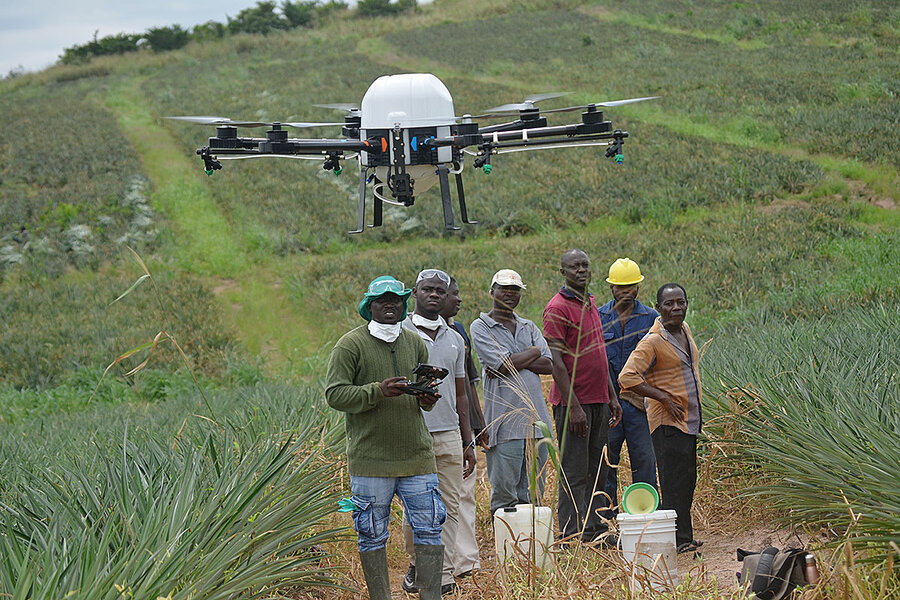While it is still early to assess the impact of digitizing African agricultural systems, there is a promising trend in improving agricultural productivity and enhancing farmer income. Technology is transforming local business environments and attracting more attention from foreign investors and entrepreneurs.
According to the Food and Agriculture Organization (FAO) of the United Nations, the world population is expected to reach 9.1 billion by 2050. To meet the needs of this growing population, global food production will need to increase by 70%. For the approximately 2 billion people expected to reside in Africa by then, agricultural productivity must accelerate at a faster rate than the global average to avoid widespread food shortages (sources from resopp-sn.org ).
In Africa, food challenges stem from various factors, including population growth, erratic rainfall, high energy costs, and the impact of lacking modern agricultural technology. While African governments have implemented numerous policies over decades to enhance agricultural productivity, the income of most farmers has only slightly improved. Many continue to use traditional tools, and globalization has provided Africans access to new technologies and innovations previously unavailable. Entrepreneurs are leveraging these technologies to improve agriculture, a primary source of employment on the African continent.
African farmers are not appealing to foreign advanced agricultural technology companies as each farmer, on average, plows only 1.6 hectares, and only 1% of commercial loans are allocated to agriculture. Despite the eagerness of African farmers to adopt new technologies, they face challenges in accessing both technology and financial support due to their scale.
However, this trend is on the verge of change. Entrepreneurs are now keenly interested in understanding how farmers work and how to help increase their income. With the advent of mobile phones, machine learning, drones, genetic engineering, big data, genomics, cloud computing, and other new technologies becoming more affordable and accessible, barriers to entering agricultural technology have diminished. Entrepreneurs can provide solutions to small African farms in a cost-effective manner that aligns with what farmers can afford. This empowers African farmers to plant more crops for the increasing population, reducing resource damage to the environment. Currently, technological innovations in African agriculture mainly include the following two aspects:
Precision Farming
New mobile technologies empower farmers with information. From weather tracking to information sharing, these products are inclusive and diverse enough to provide suitable assistance for various scenarios.
Drones equipped with special sensors are being used in the tech hub of Ghana in West Africa. They enable farmers to detect weeds and diseases, measure post-disaster damage, and estimate fertilizer needs.
Precision agriculture company Zenvus in Nigeria assists farmers in using the right fertilizer and optimizing irrigation on their farms by measuring and analyzing soil data such as temperature, nutrients, and nutritional health. The process promotes data-driven agricultural practices among smallholder farmers, enhancing agricultural productivity and reducing input waste.
Kenyan startup UjuziKilimo provides timely, accurate, and actionable advice to farmers in remote areas lacking market and weather information by analyzing soil and agricultural conditions using sensors. The goal is to increase productivity through precise insights, aiding in irrigation adjustments and determining individual plant needs.
SunCulture in Kenya combines solar energy efficiency with drip irrigation, offering farmers a cost-effective solution to irrigation, resulting in yield increases of over 300%.
Increasing Farmer Income
Electronic payments and small loans provide more convenient banking services for those without access to banking. This is particularly crucial for African agriculture, allowing smallholder farmers to save money, receive funds quickly when needed, and pay for agricultural inputs. It enables smallholder farmers to access loans more conveniently, fostering greater and more reliable connections for distributors and direct consumers.
Kenyan company FarmDrive connects smallholder farmers without bank accounts or inadequate services while helping financial institutions cost-effectively increase their agricultural loan portfolios. FarmDrive collects data on farmers, tracks their agricultural activities via mobile phones, combines these activities with existing agricultural data, develops a credit record, and shares it with credit assessment and financing departments at banks. Currently, they have over 300 farmers on their platform, helping them access over $150,000 in loans.
While it is still early to assess the impact of digitizing African agricultural systems, there is a promising trend in improving agricultural productivity and enhancing farmer income. Technology is transforming local business environments and attracting more attention from foreign investors and entrepreneurs. When individual mobile application developments prove insufficient to meet Africa’s needs, many turn to agricultural technology.
However, investors and entrepreneurs need to collaborate closely with locals. Traditional beliefs are widespread in African agriculture. For example, many farmers initially refuse to use chemical fertilizers, fearing irreversible land poisoning. Entrepreneurs may not be able to change their farming practices. Agricultural technology pioneers need to gain farmers’ trust through on-site demonstrations, demonstrating that new technologies can bring better results (quotes from resopp-sn ).
Digital technology provides enormous untapped potential for farmers, investors, and entrepreneurs, thereby increasing the efficiency of African food production. Technology can bring significant economic, social, and environmental benefits. Indeed, in this generation, Africa’s agricultural challenges can be addressed through reshaping traditional industries.
